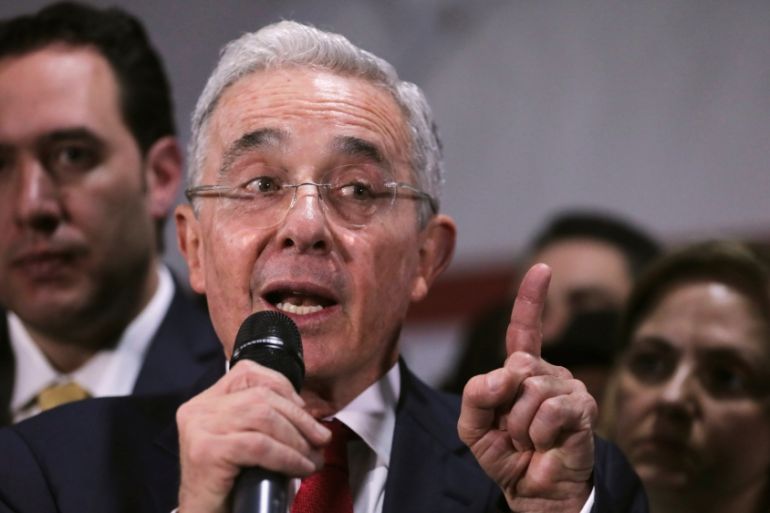Colombia’s ex-president testifies over witness tampering, bribery
Alvaro Uribe is accused of trying to bribe members of a paramilitary group who had damaging information against him.

Popular and influential former President Alvaro Uribe has testified before Colombia’s Supreme Court in a case involving alleged witness tampering and bribery.
The private hearing on Tuesday was the first time a former president has been called to testify before the country’s highest court and marked the latest instalment in a long-running feud between the right-wing Uribe and leftist Senator Ivan Cepeda.
Keep reading
list of 4 itemsSlapped: Speaking Up In Thailand
Vietnam tycoon Truong My Lan sentenced to death in $12.5bn fraud case
Mexico cuts ties with Ecuador after police raid embassy
A magistrate queried Uribe behind closed doors for over seven hours about accusations that, through a lawyer, he tried to influence and even bribe members of a paramilitary group who had damaging information about him.
After the questioning, the court released a brief statement announcing that officials had concluded there were sufficient grounds to continue investigating Uribe, although no charges have been filed.
Uribe – a mentor of President Ivan Duque and a current senator – could serve time in prison if eventually convicted in the case. He has repeatedly declared his innocence and questioned the court’s independence.
“I think [the magistrate] will have perceived my respect for justice and my eagerness for the truth,” Uribe told reporters at the headquarters of his Democratic Center party.
Uribe’s appearance drew both protesters and supporters to the hearing in central Bogota. His testimony had been expected to stretch over several days, but local media reported he had answered some 280 questions and would not be called on Wednesday.
In 2012, Uribe accused Cepeda of orchestrating a plot to tie him to right-wing paramilitary groups during jail visits to former fighters.
But in February 2018, the court, which investigates all criminal matters involving legislators, said Cepeda had collected information as part of his work and had not paid or pressured former paramilitaries.
Instead, it was Uribe who was at fault, the court said.
The ex-president’s allies began new efforts to manipulate witnesses even after that February decision, the court said in July 2018.
Mixed reaction
Uribe – famous for mounting an aggressive military offensive against Marxist fighters during his 2002 to 2010 tenure – and his family have long been accused of links to paramilitaries, but previous investigations have borne little fruit.
Various allies of the former president have been investigated or convicted for connections to paramilitaries.
Duque has repeatedly backed Uribe, and Uribe’s party has said the case is a set-up.
In a video posted on Tuesday afternoon, the court’s president said only the evidence would influence judges, not support for Uribe from officials or protesters.
“Uribe is a person who raises passions both from supporters and detractors alike and so, I think, regardless of what happens, nobody is going to be perfectly content with the court’s decision,” Sergio Guzman, a political analyst, told Al Jazeera.
“But we need to stand by it and stand by our institutions.”
Many Colombians are either devout Uribe loyalists who praise his iron-fisted approach to defeating leftist rebels, or sceptics who have long wanted to see the former leader in court.
“He has persecuted this country’s criminals, guerrilla, drug traffickers. He demobilised paramilitaries, extradited them to the US,” Mila Romero, Uribe’s supporter, told Al Jazeera.
“That’s why he is the victim of a plot against him. It’s the conspirators and the political left trying to take over the country but they will fail.”
Right-wing paramilitary groups, formed in the 1980s to fight leftist rebels, were financed by drug traffickers, ranchers and landowners.
The groups allegedly committed massacres, rapes and mass displacements. Some fighters demobilised during Uribe’s tenure, but others founded crime gangs which continue to traffic drugs.